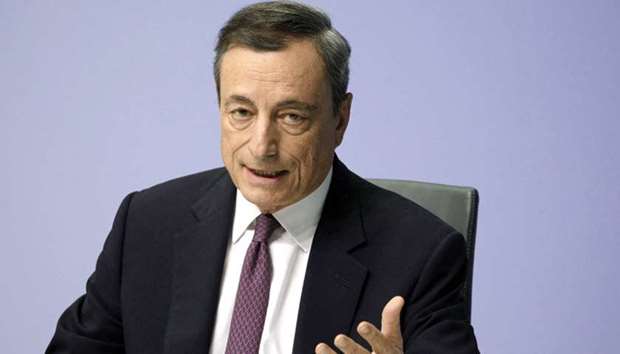The European Central Bank is again struggling to get the message across to markets that any unwinding of stimulus will be slow and steady.
The euro soared, bonds slid and investors this week stepped up bets that interest rates will rise before the end of 2018, disregarding President Mario Draghi’s assurances that no such thing will happen until well after asset purchases — scheduled until at least September — come to a halt.
The latest anxiety about a shift in the ECB’s stance was sparked by revelations that the Governing Council agreed at its December meeting that a review of its policy language may be warranted early this year. It follows weeks in which some officials have called for a firm end-date for bond purchases.
Money markets now see a 74% chance of a 10-basis point increase in the deposit rate by the end of this year, compared with 34% one day before the ECB meeting on December 14 and 46% at the end of last year. Investors also see two 10-basis point increases by June next year.
Still, the hawkish comments were all made before data showed euro-area price pressures remain muted, leaving the central bank well short of its inflation goal.
“The market reaction just shows how nervous it is about premature tightening,” said Christoph Rieger, a fixed-income strategist at Commerzbank.
“The minutes didn’t contain any new policy hints from what we didn’t know before. I would expect more economic cheerleading but at the end of the day the rate hikes that are now being factored in are unlikely to be realised.”
An ECB spokesman declined to comment on the market reaction to the policy account.
With the 19-nation economy increasingly strong enough to withstand an unwinding of unprecedented stimulus, reining in speculation about the ECB’s strategy has become more difficult, as Draghi knows from experience.
Policy makers spent weeks setting the record straight last spring after markets jumped on suggestions that interest rates could rise before bond buying ends. At the ECB Forum in Portugal last June, Draghi himself set the euro racing by saying that “reflationary forces are at play.”
The euro jumped 0.7% on Thursday and extended gains yesterday to the strongest against the dollar in more than three years, also bolstered by reports that Germany is getting closer to forming a government.
German government bonds slid, with the yield on 2-year notes touching the highest in more than six months. The 10-year yield is up 14 basis points this week after reaching the highest since July.
The ECB isn’t alone in facing jumpy markets. A minor tweak in the Bank of Japan’s bond-purchase operation Tuesday saw the yen strengthen more than 1% in two days. A change in the way China’s central bank manages the yuan sparked losses in that currency.
At their December meeting, ECB policy makers agreed that while economic data had been more positive than expected, underlying inflation “had yet to show convincing signs of a sustained upward trend.” The Governing Council even praised itself for maintaining a “steady hand” in communicating a reduction in bond purchases.
At the same time, it left the door open to more stimulus if needed, despite a push by some officials for a firm commitment to bring the program to an end. The next meeting is on January 25.
“What will be interesting in coming weeks is whether the doves will try to set the record straight,” said Marchel Alexandrovich, an economist at Jefferies in London.
“If this doesn’t happen, the balance in the Governing Council could really be changing.”

ECB president Mario Draghi gestures while speaking during a news conference in Frankfurt. The euro soared, bonds slid and investors this week stepped up bets that interest rates will rise before the end of 2018, disregarding Draghi’s assurances that no such thing will happen until well after asset purchases u2014 scheduled until at least September u2014 come to a halt.
